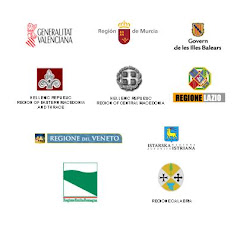
L. to R.: Mr Klipp, SG of the AER, Ms Hübner, MEP Chairwoman of the Committee REGI, and Mr Ripoll, Valencian Regional Deputy Minister in charge of EU affairs
Valencia (E), 28th August 2009.
In her first speech as chairwoman of the European Parliament’s Committee for Regional Development, Danuta Hübner has said that water will be a “major priority” of the EU’s Regional Policy. “There are regions that will require specific responses, which will be more affected than others by droughts, floods or water scarcity,” Ms Hübner said today. “That is why, more than ever, the European regional policy 2007-2013 will be ambitious in its environmental initiatives at local and regional level.” Ms Hübner was speaking on the final day of the Assembly of European Regions’ (AER) 14th annual Summer School, hosted by the Spanish region of Valencia.
Focusing this year on water issues, the week-long event in the city of Valencia brought together around 150 regional politicians, officers and young people, along with international experts and EU officials, to address the many challenges related to water.
AER president Michèle Sabban, speaking earlier this week, said: “We are not in Valencia by accident. Spain is the European country most threatened by desertification and drought.” “By bringing young people together with experts and politicians to discuss this increasingly global problem, we hope to promote a new “water culture” in the regions. The young people here can take back to the regions what they have learnt this week, thereby raising awareness among peers who will face the consequences tomorrow of what we do today.”
The summer school featured expert speakers, roundtables and workshops, along with study visits where participants could see firsthand the Valencia region’s expertise in water management.
Valencia’s deputy minister for European affairs, Rafael Ripoll, noted that the region of Valencia, whose strong commitment to addressing water scarcity has made it a European leader in the field, is the “perfect framework to talk about promoting the better use of water across all the European regions.” Background The proper management of water plays a key role in maintaining biodiversity, human health as well as in economic and social development. The “blue” challenge is of huge importance as the world enters a water crisis. Safe access to water for all is one of the Millennium Goals, while water savings can be improved by around 40% in Europe.
By bringing together decision makers, officials and young people, the AER Summer School in Valencia aimed to provide the tools to regions to tackle the challenges of water management. Participants were able to share experiences, develop new instruments to raise awareness and define strategies to contribute to creating a water-saving culture across the regions of Europe.
Find more information about AER’s 14th Summer School at:
 Either the seminar was a big success or the room was too small, but the participants report that the place was packed
Either the seminar was a big success or the room was too small, but the participants report that the place was packed 











